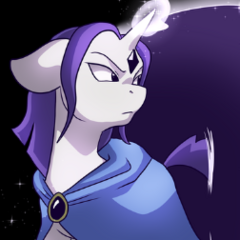RPG Rants
Random Stat Generation
I do not like games where you randomly determine your character's statistics. Dungeons and Dragons is the most famous example of this, and that is the game I will be talking about for the most part. There is a fatal flaw in creating a character this way. The problem is you could end up rolling a really bad character. Who wants to play a character with bad stats? Some will claim that this is not a problem because you could also roll a character with really good stats. But just because you have the possibility of rolling well doesn't justify the case when you roll poorly.
Let us review the concept of averaging over many rolls. Consider rolling for an attack. Sometimes you hit and sometimes you miss. This doesn't matter as long as you win on average over many attacks. Failing the roll a few times doesn't matter that much. If you miss this time, you know that you will hit at some point in the future. But this is not the case when rolling your initial stats. For these rolls, you get one chance. Therefore, there is no averaging process. Over the course of many campaigns perhaps you play many characters. In this case then maybe you have some weak and some strong characters. Maybe only in this situation do you find consolation in an average. But who plays with the philosophy, “It's ok to have a crappy character this time because maybe next time I will have a better character”?
Some people have said that they like playing flawed or weak characters. They claim that the characters are more interesting to play. This makes no sense to me. I'm not talking about a personality flaw. I'm talking about a weak stat. So I'm talking about the numbers. Perhaps I can understand someone having fun playing a character who can't lie. But what is so fun about playing a character with a low wisdom score? I think someone claiming that this is fun is simply justifying a bad game design. For example, consider a game with a point-buy system. Players are given a certain number of points to assign to their ability scores. Would you decide to throw away one or more points in order to purposely make a weak character? I can't imagine someone doing that on a point-buy system, yet someone would justify that on a random roll system.
Another part of this discussion is the idea that you should come up with a character concept first, then come up with the numbers. What happens if your randomly rolled numbers don't match your concept? Why would you let random dice rolls dictate your character? I am not so interested in a character concept, as such. Meaning, I'm not so interested in a background story. Why can't my concept be that he is a fighter? If the DM tells me that I need a back story then I will come up with the bare minimum that he wants.
Getting back to the idea of having a weak character, would you choose a weak character over a strong one? In D&D, the stats can range from 3 to 18. If the DM told you that you could choose your stats, wouldn't you choose all 18s? I see no reason not to. The older editions of D&D are notorious for being difficult and deadly. Having a maxed out character does not really make the game too easy.
Combat Without A Map
Put simply, it can't be done. More accurately, it can't be done well. Of course people play this way, but the combat has to be simplified. You can't have more than about two enemies attacking each character. Any more than this and it would be too awkward to keep track of where everyone is. You also can't employ advanced tactics. For example, one strategy is to know what your range is on a ranged weapon, the distance to a target, and the target's movement. You can put yourself at a distance such that the enemy can't reach you in his next turn. You can also flank, calculate area of affects for spells, environmental effects, and other things. There is no way you can do these things without keeping track of character positions.
Having high detail in combat does not preclude role playing. People have used the term “theater of the mind,” as if this were inherently better than miniature combat. I think this is a cop out. You lose too much when you can't employ tactics. A game, by definition, has rules. The rules are meant to adjudicate actions. How can you have a situation where the DM just makes it up as he goes along?
Wizard: “I target my fireball so that it hits the orcs but misses my allies.”
DM: “Um, ok, I'll say that your allies are out of range.”
Archer: “Wait, if I'm out of range of his fire ball, then am I still in short range with my bow?”
Thief: “But I'm at the door trying to pick the lock, wouldn't that put me in the blast radius?”
DM: “Um, I don't know.”




2 Comments
Recommended Comments
Create an account or sign in to comment
You need to be a member in order to leave a comment
Create an account
Sign up for a new account in our community. It's easy!
Join the herd!Sign in
Already have an account? Sign in here.
Sign In Now